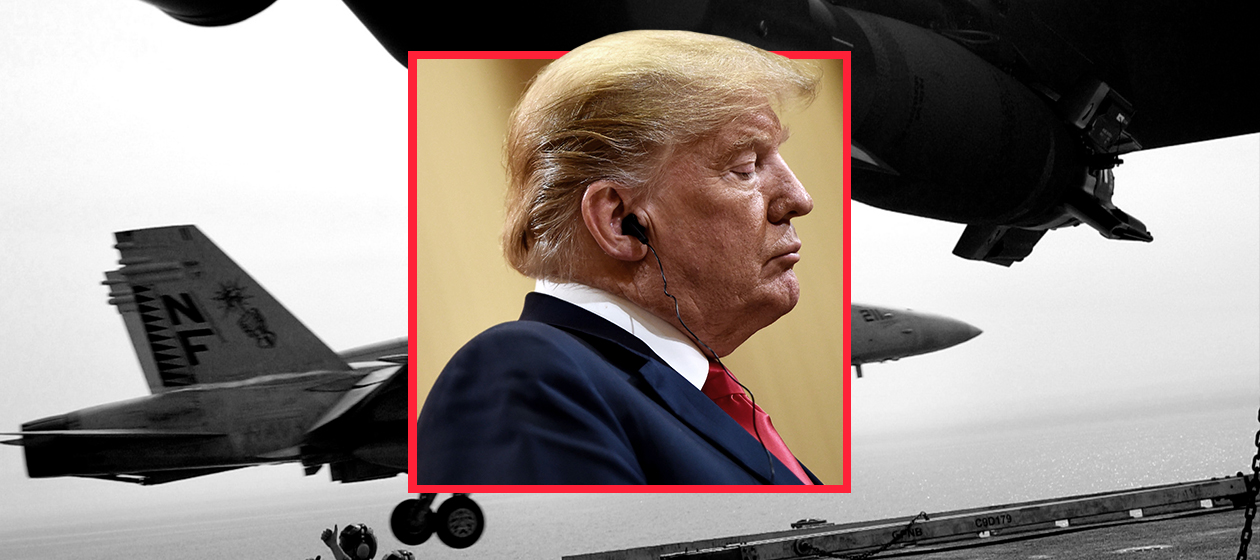Trump's Russia troubles are a win for war hawks
How the president's non-interventionism backfired


A free daily email with the biggest news stories of the day – and the best features from TheWeek.com
You are now subscribed
Your newsletter sign-up was successful
For many, President Trump's press conference with Russian President Vladimir Putin Monday was unforgivable. In it, Trump called into question the integrity of his own intelligence agencies, while giving credence to the feigned innocence of the Russian state, despite evidence that it interfered with the 2016 election.
How is Trump spinning the conference? As a step toward world peace, of course. "I would rather take a political risk in pursuit of peace than to risk peace in pursuit of politics," he said while standing next to Putin. Some of his supporters are echoing this "give peace a chance" mantra: "President Donald J. Trump follows in the footsteps of presidents Richard Nixon and Ronald Reagan by engaging in groundbreaking talks with superpowers that traditionally were seen as enemies of the United States, as a means to find common ground on trade and foreign policy in a way that has preserved the peace today," wrote former Trump campaign manager Corey Lewandowski.
But Trump's actions in Helsinki, and his deference to Putin, are actually undermining his non-interventionism message entirely and giving ample fuel to war hawks.
The Week
Escape your echo chamber. Get the facts behind the news, plus analysis from multiple perspectives.

Sign up for The Week's Free Newsletters
From our morning news briefing to a weekly Good News Newsletter, get the best of The Week delivered directly to your inbox.
From our morning news briefing to a weekly Good News Newsletter, get the best of The Week delivered directly to your inbox.
A lot of smart conservatives, and even a few libertarians, supported Trump in 2016 because they thought he would be a Republican dove relative to Hillary Clinton and the Democratic hawks, to say nothing of most of the rest of the GOP presidential field. Trump called the Iraq War a "big, fat mistake." He wanted to pull out of Syria and Afghanistan. He said it would be a good thing to get along with Russia. He is clearly invested in a diplomatic resolution of the North Korea nuclear question.
"Just as much as it's about making America great, Trump's agenda is about making America a normal country," venture capitalist Peter Thiel said in a speech before the presidential election. "A normal country doesn't fight five simultaneous undeclared wars. In a normal country, the government actually does its job."
The bet was that Trump could sell a less interventionist foreign policy to the most hawkish GOP voters, connecting deeply with the conservative base, thereby altering the Republican foreign-policy consensus. If all this sat uneasily with Trump's tough talk about torture, taking Iraqi oil, tearing up the Iran Deal, and bombing the hell out of ISIS, it was also more accessible to the Republican primary electorate than the more consistent libertarianism of Ron Paul or the prudent internationalism of Jon Huntsman.
The gambit worked. Trump, after all, is president of the United States. South Carolina Republican primary voters who booed Paul voted for Trump. Rudy Giuliani, Paul's rival 2008 GOP candidate who encouraged that booing, also supported Trump. Partisan Republicans applaud Trump's discussions with Putin and Kim Jong Un, much as they would have jeered Barack Obama in similar circumstances.
A free daily email with the biggest news stories of the day – and the best features from TheWeek.com
But what long-term peace dividends Trump will pay remains to be seen. He has mostly filled the national security positions in his administration with conventional Republican hawks, where the party's talent pool is deepest, and consequently has continued waging the five undeclared wars Thiel warned about. And while it is good for Trump to pursue talks with Putin and Kim, it is less clear that either of those autocrats are ready for peace.
Special Counsel Robert Mueller's Russia investigation hangs over Trump like a dark cloud, and makes him the worst person to pursue rapprochement with Moscow. His stubborn refusal to criticize Putin and vacillation on whether Russia interfered in the 2016 elections — more plausibly driven by insecurity over an asterisk being attached to his presidential win and a desire to be seen as a man who can cut deals with dictators than kompromat — raises suspicions of collusion and makes a less hawkish posture untenable.
Trump's Putin press conference has made it tougher sledding for anti-war conservatives to defend him. In fact, Trump's toxicity has helped rehabilitate liberal hawks and conservatives who sold the Iraq War. Progressive Democrats make no distinctions between Russia's 2016 crimes and 9/11 or Pearl Harbor; Bill Kristol is politely received on MSNBC; Max Boot has a column in The Washington Post; David Frum's "Axis of Evil" could practically be a Resistance trope by this point.
Maybe this will soon blow over. Or maybe Mueller's Russia probe will bring to light other unpleasant surprises. At the moment, however, Trump is whipping the American people into a kind of frenzy that seldom results in peace.
W. James Antle III is the politics editor of the Washington Examiner, the former editor of The American Conservative, and author of Devouring Freedom: Can Big Government Ever Be Stopped?.
